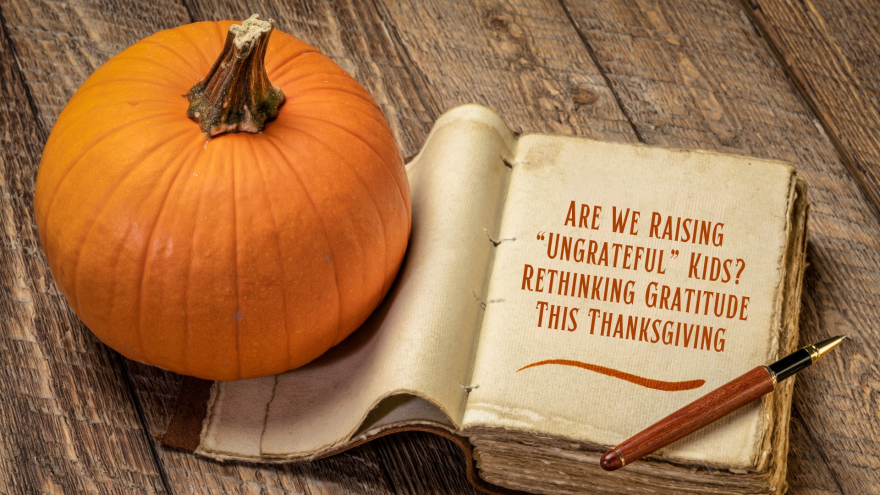|

Hello, Coco
Thanksgiving is almost here, and as parents, we hope our efforts to teach our kids gratitude will come to fruition—hoping they might express heartfelt thanks toward us and others. But let’s be honest—sometimes, our efforts seem to go unnoticed. We give so much, yet when our kids don’t respond with the gratitude we crave, it can sting. It’s normal to feel unappreciated and wonder, “Am I raising an ungrateful child?”
Sometimes, a lack of gratitude hits hard because we’re already running on empty. Parenting is tough, and it’s easy to feel drained when our efforts go unrecognized. With so many unseen daily sacrifices, we naturally hope for some appreciation in return. When we don’t get it, we may even start to catastrophize, worrying that our kids will grow up to be selfish, uncaring, or rude.
But over time, I’ve come to see that a child’s lack of gratitude isn’t about selfishness—it’s part of a developmental journey toward learning appreciation.
Understanding That Gratitude Is Developmental
Gratitude is complex and requires skills like empathy and perspective-taking, which develop gradually in children. For kids with ADHD or other executive functioning challenges, this journey may take even longer. Younger kids, especially those under six, may see “thank you” as just a phrase, not fully grasping its meaning. As they grow and with our guidance, they begin to appreciate the thought behind gestures and feel genuine gratitude.
Gently Guiding Our Kids Toward Thankfulness
To help our kids develop gratitude beyond just saying “thank you,” we can guide them gently by asking open-ended questions. One way to do this is through curiosity. After receiving a gift, we might ask, “How do you think it felt for Grandma to give you that?” or “What’s something you like about it?" This encourages kids to think about others’ perspectives in a way that feels natural rather than forced.
Humor is also a great tool. If your child forgets to say “thank you,” try stepping in playfully: “Thanks, Mom, that was so thoughtful!” or “Wow, Dad, that was awesome—thank you!” This lighthearted approach helps kids absorb the concept of gratitude in a fun way.
And, of course, we can lead by example. Research suggests that kids are more likely to develop gratitude when they see it consistently modeled by adults. Expressing thanks for the little things—a good meal, a beautiful day, or a quiet moment—shows kids that gratitude is woven into everyday life.
As we encourage gratitude in our kids, it’s also essential to show ourselves appreciation for all the care and effort we give every day. That way, we’re filling our emotional cup—no matter where our children are in their gratitude journey.
Valuing Ourselves and Our Efforts
When we depend on our kids to meet our need for appreciation, we’re setting ourselves up for disappointment. Instead of waiting for our kids to make us feel appreciated, what if we took the time to value ourselves? Acknowledging and appreciating our hard work helps us find internal validation.
Last week, I spoke with a mom, and I asked her to pause and acknowledge everything she did well as a mom: her hard work, devotion, and sacrifice. Within seconds, her eyes welled up with tears. As moms, we rarely take the time to pause long enough to recognize our worth.
Giving ourselves credit makes us less dependent on our kids’ recognition. As a simple exercise, pause (even for a few seconds) and acknowledge one thing you are doing well each day—handling a challenging moment, stopping to breathe, being flexible, making dinner, or simply getting everyone through the day. The more you appreciate yourself and recognize the value you bring to your family, the less “personal” you will take your kiddos' (especially teens') lack of outward expression of gratitude.
Creating an Environment of Gratitude
As parents, we have the power to shape a home that fosters genuine gratitude. By showing appreciation, being patient, and letting go of the need for immediate reciprocation, we teach our kids that gratitude is a process, something they’ll grow into in their own way and time. When we create a supportive environment, we allow our kids to develop a deep and heartfelt sense of thankfulness.
This Thanksgiving, let’s take time to appreciate our efforts, value the love we pour into our families, and remember that gratitude is a journey. With patience, playfulness, and a little grace, we can build a family culture where thankfulness is seen, felt, and, in time, expressed.
Warmly,
Coco & Vicky
|